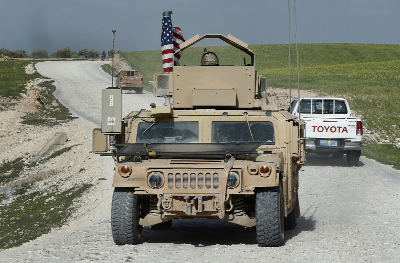
AP, Halawanji :
Perched on a green hilltop, Kurdish and Arab fighters face a tense front line separating them from Turkish-backed forces in this part of northern Syria. Behind them, American troops drive up and down the roads. Their aim: Make their presence known to prevent bursts of gunfire from spiraling into a battle.
Down the hill and across a stream are the rival forces: Syrian opposition fighters. They have taken positions on a crossroads in the village of Halawanji and on rooftops with views up to the hill. Beyond them, on another hill, Turkish troops have a base, ready to back up their allies if needed.
This front line threatens to ignite at any time, with the militaries of two NATO members on opposing sides. The crowded terrain has become more combustible as Turkey ever more loudly threatens to push through these lines to attack the nearby Kurdish-Arab town of Manbij and other Kurdish-run towns further east. The presence of the Americans is a main obstacle preventing them from doing so.
Further hiking tensions, a roadside bomb in Manbij late Thursday killed two coalition personnel, an American and a Briton. Kurdish officials accuse Turkey and its allies of carrying out acts of violence in the town to sow instability, including several recent smaller bombings, protests and an attempted assassination attempt on a Kurdish official – although there is also the possibility Islamic State group militants are behind the violence.
Manbij is highly strategic: the main town on westernmost edge of the stretch of Syrian territory held by the U.S.-backed Syrian Kurds, running along the border with Turkey. Mixed Kurdish-Arab Syrian forces liberated Manbij from the rule of the Islamic State group in 2016 with help from the U.S.-led coalition. But Kurdish control of the town infuriated Turkey, which views the main U.S. Kurdish ally, the YPG militia, as “terrorists” linked to Kurdish insurgents on its own soil.
U.S. troops first deployed in the area about 16 months ago, after Turkish-backed Syrian forces advanced on areas near Manbij, in a race for control of territories as IS militants collapsed. The deployment prevented repeated clashes between the two rival forces. The U.S-backed Syrian fighters at Halwanji say their Turkish-backed rivals downhill increasingly open fire on them, trying to provoke a fight and create a pretext for an incursion. One commander said it happens as often as three times a week.
Perched on a green hilltop, Kurdish and Arab fighters face a tense front line separating them from Turkish-backed forces in this part of northern Syria. Behind them, American troops drive up and down the roads. Their aim: Make their presence known to prevent bursts of gunfire from spiraling into a battle.
Down the hill and across a stream are the rival forces: Syrian opposition fighters. They have taken positions on a crossroads in the village of Halawanji and on rooftops with views up to the hill. Beyond them, on another hill, Turkish troops have a base, ready to back up their allies if needed.
This front line threatens to ignite at any time, with the militaries of two NATO members on opposing sides. The crowded terrain has become more combustible as Turkey ever more loudly threatens to push through these lines to attack the nearby Kurdish-Arab town of Manbij and other Kurdish-run towns further east. The presence of the Americans is a main obstacle preventing them from doing so.
Further hiking tensions, a roadside bomb in Manbij late Thursday killed two coalition personnel, an American and a Briton. Kurdish officials accuse Turkey and its allies of carrying out acts of violence in the town to sow instability, including several recent smaller bombings, protests and an attempted assassination attempt on a Kurdish official – although there is also the possibility Islamic State group militants are behind the violence.
Manbij is highly strategic: the main town on westernmost edge of the stretch of Syrian territory held by the U.S.-backed Syrian Kurds, running along the border with Turkey. Mixed Kurdish-Arab Syrian forces liberated Manbij from the rule of the Islamic State group in 2016 with help from the U.S.-led coalition. But Kurdish control of the town infuriated Turkey, which views the main U.S. Kurdish ally, the YPG militia, as “terrorists” linked to Kurdish insurgents on its own soil.
U.S. troops first deployed in the area about 16 months ago, after Turkish-backed Syrian forces advanced on areas near Manbij, in a race for control of territories as IS militants collapsed. The deployment prevented repeated clashes between the two rival forces. The U.S-backed Syrian fighters at Halwanji say their Turkish-backed rivals downhill increasingly open fire on them, trying to provoke a fight and create a pretext for an incursion. One commander said it happens as often as three times a week.

